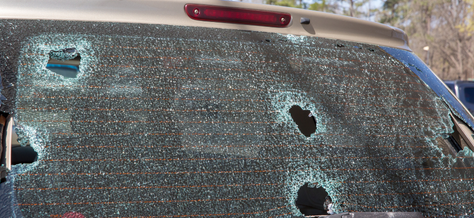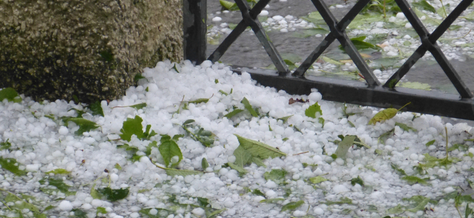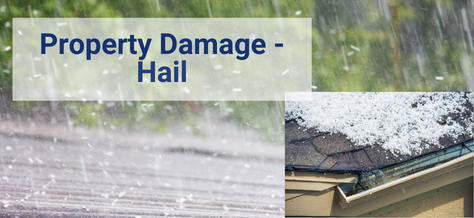Hail Damage Insurance Claim: Protect Your Property and Rights
When the skies darken, and hail starts to pelt down, the last thing on your mind is the potential property damage. Hailstorms, seemingly harmless yet highly destructive, can wreak havoc on your property. From rooftops to vehicles, no asset is safe from their icy assault. Understanding the types of hail damage insurance claim available and the necessary steps to take is crucial for protecting your property and wallet. Ethen Ostroff Law guides you through this process to protect your rights and secure the compensation you deserve.
What is hail?
Hail is a type of solid precipitation that occurs when frozen rain forms into layered pellets and falls from cumulonimbus clouds in showers. Individual balls or irregular lumps of ice are called hailstones. While hail is commonly associated with colder temperatures, it can form in warmer environments.
Hailstones can be transparent, partially opaque, or completely opaque. They have diameters ranging from 5 to 50 mm and are usually circular, conical, or irregular in shape. Hail always falls as showers and is most common during heavy thunderstorms.
Hailstorms in the United States
The National Weather Service Storm Prediction Center Annual Severe Weather Report Summary has 400 more hail reports than in 2022, just over halfway through 2023. There had been 4,834 hail reports across the country as of mid-July, a 9% increase from the previous year’s total of 4,436. Texas was the hardest hit, with over 1,000 reports, followed by Colorado, Illinois, Kansas, Missouri, and Nebraska, each with 250 or more.
Top 10 States Most Vulnerable to Hailstorms
The following are the top ten states most vulnerable to hailstorms due to their location, climate, and topography:
- Texas
- Nebraska
- Minnesota
- Kansas
- South Dakota
- Colorado
- Wyoming
- Oklahoma
- Iowa
- Missouri
Common Types of Hail Damage to Property
Hailstorms can leave a trail of destruction on property. Here are examples of damages that can result from a hailstorm:
- Roof damage: Hail can cause dents, cracks, and missing shingles, leading to leaks and further structural issues if not addressed promptly.
- Siding and window damage: Hail can chip, crack, or puncture sidings and windows, compromising a home’s insulation and security.
- Vehicle damage: Dents and broken windows are common hail-related damages to vehicles, affecting aesthetics and functionality.
- Landscaping damage: Delicate plants and trees can suffer irreparable harm from hail, affecting the overall aesthetics of your property.
- Crop damage: Hail can cause a range of damage to crops, affecting their quality and yield.
- Gutter damage: Hail can dent, bend, or break gutters and downspouts.
- HVAC system damage: Hailstones can dent or damage HVAC (Heating, Ventilation, and Air Conditioning) units.
- Exterior paint damage: Hail can chip or peel exterior paint from buildings and structures.
- Water damage: Once hail hits and damages a property’s exterior, water can find its way into cracks in the shingles and begin to damage the interior.
- Damage to outdoor belongings: Hail can damage outdoor furniture and other belongings.
- Cost of repairs: Hail damage can be costly to repair. The cost of repair depends on the extent of the damage and the type of property.

How to Prevent or Minimize Hail Damage on Your Property
While it is not always possible to protect your property from hail damage, here are some proactive measures you can try to help minimize the damage:
- Keep your roof in great shape.
- Protect your windows and doors. There are numerous options, ranging from pre-installed permanent systems that roll down or slide over windows to temporary panels that can be stored when not in use.
- Keep your outdoor belongings safe. Have a system in place so you can always be ready if it starts hailing like tarps.
- Maintain your trees. Trim your trees, as branches can break free and cause damage to your property during a hailstorm.
- Close drapes, blinds, or window shades during a severe hailstorm to keep broken glass from blowing inside.
- Park and cover your vehicle in a secure location. Hailstorms can cause major damage to vehicles, specifically those not completely covered by a garage or other indoor shelter. Move your vehicle to a covered parking area or try covering it or its windshield with something like a blanket to minimize the impact of the stones.
Top Insurance Companies in the United States for Hail Damage
- State Farm Insurance: State Farm is a major provider known for excellent customer service. It offers a range of comprehensive coverage options for hail damage to property and resources for evaluating hail damage to roofs.
- The Allstate Corp: Like State Farm, Allstate is another large insurance company that offers coverage for hail damage on property and has a good reputation for customer service.
- Liberty Mutual Holding Co. Inc: Liberty Mutual offers comprehensive insurance for hail damage on property, including car insurance, business coverage, and homeowner’s insurance. It provides a user-friendly claims center and a network of top-quality repair facilities for policyholders.
- American Family Insurance Group: American Family is a top provider of high-risk home insurance. It offers coverage against hail damage to property from natural disasters such as tornadoes, hail, windstorms, and wildfires.
- Chubb Ltd: Chubb is a high-end insurance company that offers coverage for hail damage to property. It specializes in high-value homes and offers a range of coverage options.
Types of Insurance Claims for Hail Damage
Hail damage can cause significant property damage. Here are insurance coverages that can protect against the financial impact of hail damage:
- Homeowner’s insurance: This insurance generally covers damage to your home caused by hailstorms. Coverage includes repairs or replacements for damaged roofs, sidings, windows, and other structural elements. Check your policy for specific coverage details, deductibles, and limitations.
- Auto insurance: Comprehensive auto insurance typically covers hail damage to vehicles. This coverage helps pay for repairs to your car due to hail-related dents and broken windows. Comprehensive coverage is optional but recommended for protecting your vehicle from various non-collision-related damages, including hail.
- Crop insurance: Farmers can obtain specialized crop insurance policies to cover losses due to hail damage. Crop insurance helps mitigate the financial impact of reduced yields or total crop loss caused by hailstorms. These policies are essential for agricultural producers to safeguard their livelihoods against unpredictable weather events.
- Business insurance: Business property insurance covers commercial properties damaged by hail, including office buildings, warehouses, and inventory. This type of insurance helps businesses repair or replace damaged structures and assets, ensuring continuity of operations after a hailstorm.
- Renter’s insurance: This insurance covers a tenant’s personal property inside a rented property. If your belongings, such as furniture and electronics, are damaged due to hail, the renter’s insurance can help cover repair or replacement costs.
- Crop hail insurance: This specific type of insurance is tailored for farmers and covers hail damage to crops. It allows farmers to insure specific crops against hail-related losses and provides financial protection for their agricultural investments.
- Commercial property insurance: This insurance covers hail damage to commercial properties, including retail stores, restaurants, and factories. It helps businesses repair or rebuild damaged structures, ensuring minimal disruption to operations.
- Flood insurance: (in some cases). This insurance covers damage caused by hail and resulting floods. Clarify with your insurance provider regarding the specific coverage related to hail-induced flooding.

Steps to Take After Hail Damage
Is your property damaged by hail? Here are the steps you can take to file an insurance claim and get the necessary repairs:
- Document extensively: Take clear photos and videos of all damage, including close-ups and wide shots. This documentation will serve as vital evidence during your insurance claim process.
- Contact your insurance provider: Report the hail damage as soon as possible. Provide them with your documentation and answer questions about the extent of the damage.
- Obtain professional estimates: Seek professional assessment for repair costs. Multiple estimates can strengthen your claim and provide a clear picture of the necessary repairs.
- Legal assistance: If your claim is denied, delayed, or undervalued, seek legal advice.
How to Get Your Hail Damage Insurance Claim Approved
Here are the steps to take to get your hail damage insurance claim approved and the repairs you need:
- Take photographs of the damage to your property from the ground to document the damage. Keep images of your non-damaged property for comparison.
- Call your insurance company right away to report the damage and begin the claim process.
- Collect repair estimates from reputable contractors.
- Let your insurance adjuster assess the damage before doing any permanent repairs. The adjuster provides an estimate of the damage after inspection.
- If your claim is approved, you will receive a payout to cover the cost of repairs.
Common Reasons Why Insurance Companies Deny Hail Damage Claims
Here are some common reasons why insurance companies deny hail property damage claims:
- There has been no compensable loss or covered damage where covered damage has been sustained.
- Damages are found to be below the policy deductible.
- Damages are lower than what the claim includes.
- The policy does not cover losses.
- Roof damage existed before the hailstorm.
- The policyholder has not maintained the condition of the roof.
- Coverage restrictions for older roofs.
- Insurance companies contest the cause of the damage.
- Incomplete or inadequate documentation.
What to Do If Your Hail Damage Claim Was Denied
If your hail damage insurance claim was denied, here’s how you can appeal the decision and have your claim approved:
- Learn why your claim was denied. You must be given a written explanation explaining the reasons for the denial. Insist on a denial letter if you do not have one. If you are unsure, contact your insurance provider and request clarification.
- Gather additional evidence related to the hail damage, including photos, videos, and repair estimates.
- If you disagree with the insurance company’s decision, file an appeal to trigger a review of your denied claim. Include with your appeal as much evidence and documentation as you can to support your position.
- If your appeal is denied, contact an insurance claims attorney.

Can you sue your insurance company if your hail damage claim is denied?
Yes, you can. If your insurance company refuses to pay for your property damages, contest the denial of your claim. The first step is to learn why your insurer rejected your hail damage claim. If you disagree with its decision, file an appeal. If the appeal is unsuccessful, consider fighting your denied claim in court. Consult with a hail damage insurance claim attorney to better understand your legal rights and options.
Can you sue an insurance company for processing a claim too slowly?
Yes, you can sue an insurance company if it fails to process your insurance claim for hail damage on time. Consult an insurance claim attorney about the viability of your case.
Here are points to consider:
- Insurance companies are required to timely and efficiently process claims.
- Unreasonable claim processing delays may constitute a breach of contract.
- Policyholders whose claim processing was unreasonably delayed have the right to sue.
- Taking legal action against an insurance company is a time-consuming and complicated process that is not always successful.
Time Limit for Filing a Claim for Hail Damage
The hail damage claim time limit for filing may vary depending on the insurance company and policy. Consult with an insurance agent or attorney to understand the time limit for filing a claim for hail damage.
Here are general guidelines:
- Homeowners insurance claims: The majority of insurance companies require hail damage insurance claims to be filed within one year of the hailstorm. Some only give 30 days, while others have them for up to two years after the damage.
- Car insurance claims: Most insurance companies give you a one-year window to file an auto hail damage claim. The time limit differs depending on the type of policy you have, so read the restrictions of your specific coverage plan carefully.
- Property insurance claims: The terms of a commercial insurance policy ultimately determine the deadline for filing a hail damage insurance claim.
Choose Ethen Ostroff Law for Your Hail Damage Insurance Claim
At Ethen Ostroff Law, we simplify the complex world of insurance claims. Our team of dedicated attorneys specializes in personal injury cases, including hail damage insurance claims. We have a proven track record of helping clients navigate complex insurance disputes and recover the compensation they need to restore their property.
Our services include:
- A thorough assessment of your insurance policy to determine coverage.
- Comprehensive investigation of the hail damage to build a strong case.
- Skilled negotiation with insurance companies to maximize your claim.
- Aggressive representation in court if a lawsuit becomes necessary.
- Compassionate support and guidance throughout the entire process.
Don’t let hail damage leave you in financial distress.
What are you waiting for? Contact Ethen Ostroff Law now at 610-510-8883 ( by calling this number, you consent to receive SMS updates from Ethen Ostroff Law) or Submit Form to get free consultation.


